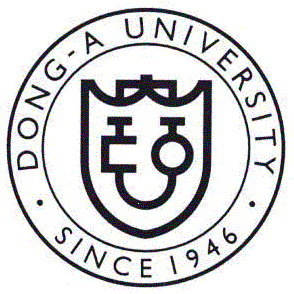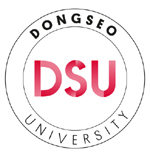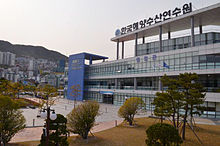The Korea Institute of Maritime and Fisheries Technology, or KIMFT, is a maritime education and research institute operated by the government of South Korea. It is based in Yeongdang-dong, Nam-gu, Busan, with an auxiliary campus on Yeongdo island near Busan Port. Each campus includes a dormitory for trainees.

South Korea, officially the Republic of Korea (ROK), is a country in East Asia, constituting the southern part of the Korean Peninsula and lying to the east of the Asian mainland. The name Korea is derived from Goguryeo which was one of the great powers in East Asia during its time, ruling most of the Korean Peninsula, Manchuria, parts of the Russian Far East and Inner Mongolia, under Gwanggaeto the Great. South Korea lies in the north temperate zone and has a predominantly mountainous terrain. It comprises an estimated 51.4 million residents distributed over 100,363 km2 (38,750 sq mi). Its capital and largest city is Seoul, with a population of around 10 million.

Busan, formerly known as Pusan and now officially Busan Metropolitan City, is South Korea's second most-populous city after Seoul, with a population of over 3.5 million inhabitants. It is the economic, cultural and educational center of southeastern Korea, with its port—Korea's busiest and the 9th-busiest in the world—only about 120 miles (190 km) from the Japanese islands of Kyushu and Honshu. The surrounding "Southeast Economic Zone" is now South Korea's largest industrial area.
The Institute was formed in 1998 from the merger of the Korea Fishing Training Center with the Korea Maritime Training and Research Institute. The first was established in 1965 as the Korea Deep-sea Training Institute. In 1978, it became an independent corporation. The research institute was founded in 1983, attached to Pukyong National University. The two were merged by an act of the National Assembly of South Korea passed in 1997.
Pukyong National University is a national university located in Busan, South Korea. The 2nd largest city of Korea, which is the location of Busan Port, Gwangan Grand Bridge, Haeundae Beach, Oruk Islet, and Jagalchi. The university has two campuses - Daeyeon-dong and Yongdang-dong. These campuses are situated near coastal district of Nam-gu. The location itself suggests that Pukyong University has a strong traditional focus on fisheries sciences and other maritime fields. The University has excellent facilities for Marine and Technology studies.
In addition to its research work, KIMFT offers a range of professional certifications. These include a certification in fish medicine.

Fish medicine is the study and treatment of the diseases of fish. Although some practitioners work primarily with aquarium fish, this field also has important applications to fisheries management.
In Australia, technical and further education or TAFE institutions provide a wide range of predominantly vocational courses, mostly qualifying courses under the National Training System/Australian Qualifications Framework/Australian Quality Training Framework. Fields covered include business, finance, hospitality, tourism, construction, engineering, visual arts, information technology and community work.
Yeungnam University is a private research university, located in Gyeongsan, North Gyeongsang, South Korea. The university's predecessors, Taegu College and Chunggu College, were founded in Daegu in 1947 and 1950 respectively. In 1967, the two colleges merged by President Park Chung-hee to form the degree-granting Yeungnam University. In 1972, the university's new main campus opened in Gyeongsan east of Daegu. The university includes colleges of Law and Medicine and a teaching hospital.

The Southeastern Maritime Industrial Region, centered on the harbor cities of Busan and Ulsan, is the Republic of Korea's second largest metropolitan area in terms of population and is the second-most developed region as well. It is also an industrial region for shipbuilding, international trade, and heavy industries, such as car making and chemical producing.
Busan Presbyterian University, also known as Busan Jangsin University, is a private Christian university in Gimhae City, South Gyeongsang province, in southeastern South Korea. It provides undergraduate training in theology, social welfare, and special education, as well as graduate training in theology and pastoral research.
The Busan National University of Education is a government-supported institution which provides training for future public-school teachers in South Korea. The campus is located in the Yeonje-gu district of Busan Metropolitan City. The university offers graduate and undergraduate programs, and enrolls 1,762 undergraduate and 565 graduate students. A primary-level lab school with an enrollment of 768 students is located on the campus. The university's current president, its third, is Sung-Taek Park.

Dong-A University is a private university in Busan, South Korea. It is the only private university and one of two universities that has both medical and law school in Greater Busan, the second-largest city in South Korea.

Dongseo University (DSU) is a private university in Busan, the second largest city of South Korea. Established in 1992 through the Dongseo Educational Foundation, it provides higher education to approximately 11,000 full-time students, including roughly 1000 international students from 69 countries.

The Fisheries and Marine Institute of Memorial University of Newfoundland, popularly referred to as the Marine Institute (MI) or simply Marine, is a post-secondary ocean and marine polytechnic located in St. John's, Newfoundland and Labrador, Canada. It is affiliated with Memorial University of Newfoundland.
TAFE NSW is an Australian vocational education and training provider. Annually, the network trains over 500,000 students in campus, workplace, online, or distance education methods of education. It was established as an independent statutory body under the TAFE Commission Act 1990. The Minister for Regional Development, Skills and Small Business is responsible for TAFE NSW.
Shenzhen Polytechnic (SZPT) is an educational institute located in Xili, Nanshan District, Shenzhen, Guangdong, China. It was founded in 1993. It has four campuses. It has 21,000 full-time and 6,000 part-time students enrolled.
The Marine Engineering and Research Institute (MERI), formerly known as the Directorate of Marine Engineering Training (DMET), now known as Indian Maritime University - Kolkata Campus and Mumbai campus, is India's national and the best known institute for the training of marine engineers and polyvalent officers.
National Archives of Korea is an agency of South Korean government, charged with preserving government-produced articles and records. It is headquartered in Government Complex Daejeon and has branches in Busan and Seongnam, and an office in Seoul.

The Asian Institute of Maritime Studies (AIMS) is a merchant marine college in Pasay City, Philippines that provides highly technical learning in terms of maritime education. It is one of the top performing maritime schools in the Philippines. It was founded in 1993 by Captain Wilijado P. Abuid along with his friends.
South Metropolitan TAFE is a Technical and Further Education (TAFE) institution based in Fremantle, Western Australia.

Korea Maritime and Ocean University is South Korea's most prestigious national university for maritime study, transportation science and engineering. It is located in Yeongdo-gu in Busan. The university is also known for having its whole campus located inside an island.











